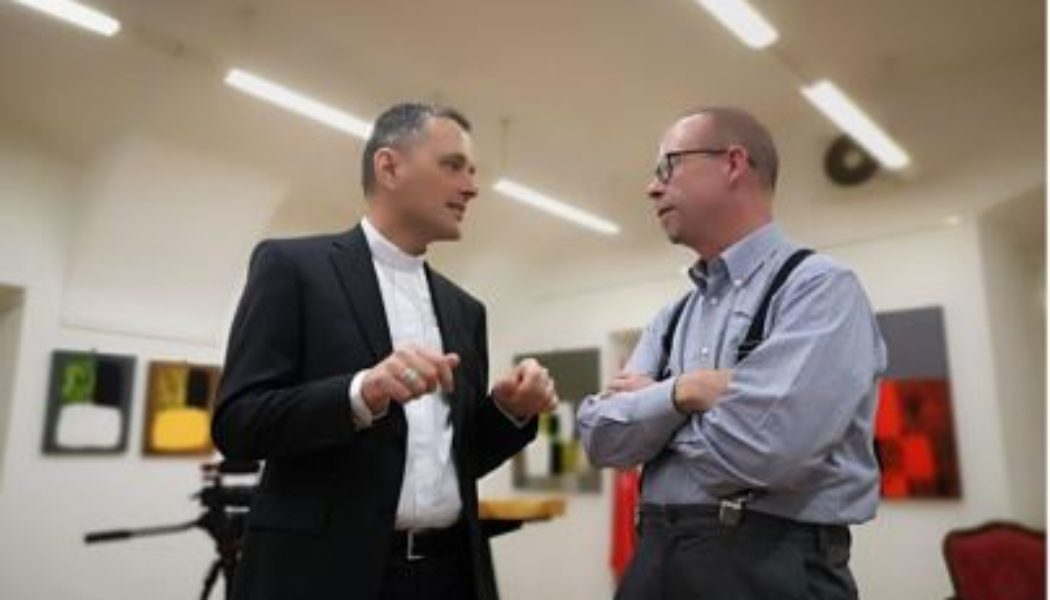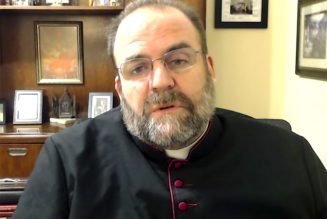|
Listen to this story: |
ROME – Multum in parvo is a Latin phrase meaning “a lot in a small package.” I know it well because it’s the motto of the pug breed of dog, and I’ve had pugs since I was in the fifth grade. (I actually dispute that pugs are dogs, because dogs occur in nature while pugs definitely don’t, but that’s for another time.)
Having just spent a week in the small central European nation of Slovenia – the entire country has a population of around 2.1 million people, which is roughly equivalent to the Kansas City metropolitan statistical area – I’ve concluded it would also be an apt slogan there, especially as it concerns Catholic affairs.
I should confess that I’m biased because my wife is half Slovenian on her mother’s side, and so naturally, I believe all things Slovenian rock. I was enormously moved, for instance, watching her ring the Bell of Souls in the Church of the Assumption on the island of Bled Lake, which is considered the heart of Slovenian culture and national identity, because I couldn’t help thinking that her ancestors probably had stood on the same spot and prayed there too.
That said, I still contend that Slovenia has a great deal to teach the global church, if only we have ears to hear.
To begin with, the reason I was in the country was to participate in the 70th anniversary celebrations for Družina, a weekly Catholic newspaper serving the entire country. (The word, by the way, means “family.”) In reality, Družina is a sort of Catholic conglomerate, since it also runs a book publishing house, several magazines, high-traffic web sites, a pilgrimage tour operation, and much else besides.
While Družina technically is owned by the six Catholic dioceses in Slovenia, that doesn’t mean it’s funded by them. On the contrary, every year the company pays dividends to the dioceses based on its earnings, which means that it has to remain financially viable.
Granted, Slovenia is traditionally a Catholic country, and so it might seem natural that a Catholic newspaper could turn a profit. Yet when you consider that a recent Eurobarometer poll found that only 32 percent of Slovenes even believe in a personal God, let alone the Catholic Church, the market success of Družina is remarkable.
Part of that success has to do with the paper’s history. During the Socialist period – one has to call it that, not “Soviet,” because Slovenia was part of Tito’s Yugoslavia, which never signed the Warsaw Pact and prided itself on being non-aligned – Družina was the only media outlet that wasn’t clearly controlled by the regime, and thus the only venue in which an alternative voice could find public expression.
Yet that cachet by itself doesn’t explain why the company remains relevant today, 30 years after Slovenia gained independence. Under the leadership of Chief Executive Officer Tone Rode, who’s a guy I can testify from personal experience who gives a whole new meaning to the term “hustle,” it’s managed not only to stay afloat but to thrive.
In a time when the Catholic press in many parts of the world seems to be struggling – consider, for instance, a recent decision to close the Washington and New York bureaus of the Catholic News Service, the official news agency of the U.S. bishops, leaving only Rome as a going operation – Družina stands as proof that even in a basically indifferent cultural environment, the right combination of pluck, imagination, and entrepreneurial drive can still carve out a role for a distinctly Catholic voice.
Beyond that, the Slovenian church is gifted with able leadership. While in the country, my wife Elise and I were able to spend some time with Bishop Andrej Saje of Novo Mesto (where Elise’s family was concentrated), who’s also the new president of the country’s bishops’ conference.
Just 56, Saje is both energetic and charismatic, a compelling face for the church in an essentially secular society. He also has a perspective that reaches far beyond the borders of his own country, reflecting Slovenia’s rich past as a crossroads of Slavic, Germanic, and Romance cultures and languages. It was once a hub of the Holy Roman Empire, and later an important center of the Austro-Hungarian Empire.
As a result, Slovenians may represent only a drop in the bucket in terms of the global Catholic population, but psychologically and culturally, they punch well above their weight. Saje, for instance, studied in Rome at the Jesuit-run Gregorian University, and has a network of friends that reaches from the U.S. to the Urals and beyond.
It’s not that Slovenian Catholicism is without its headaches.
A decade ago, a massive financial scandal in the Archdiocese of Maribor – which, among other salacious details, at one point featured the church owning a soft-core porn cable channel – depleted the church’s moral capital, and its reverberations are still being felt. More recently, in January an advocacy group for victims of clerical sexual abuse in Slovenia called Dovolj.je (“It’s Enough”), led by a priest who’s an abuse survivor himself, demanded the creation of an independent commission to study abuse cases in the country. In early April, Saje delivered an apology to abuse victims in the name of the Slovenian church, marking a day of prayer for victims.
There’s even a Slovenian link to the current Vatican “Trial of the Century,” as one of the charges against Italian Cardinal Angelo Becciu is that he conspired with an Italian political analyst and humanitarian security advisor, Cecilia Marogna, to embezzle Vatican money through an organization she ran in Slovenia.
Yet such difficulties notwithstanding, there’s a great deal about the Slovenian church that could be inspiring and helpful elsewhere. The word “Catholic,” after all, means “universal,” and Slovenia may be the ultimate proof that when one seeks interesting case studies in the global church, size really doesn’t always matter.
Follow John Allen on Twitter: @JohnLAllenJr
Join Our Telegram Group : Salvation & Prosperity









